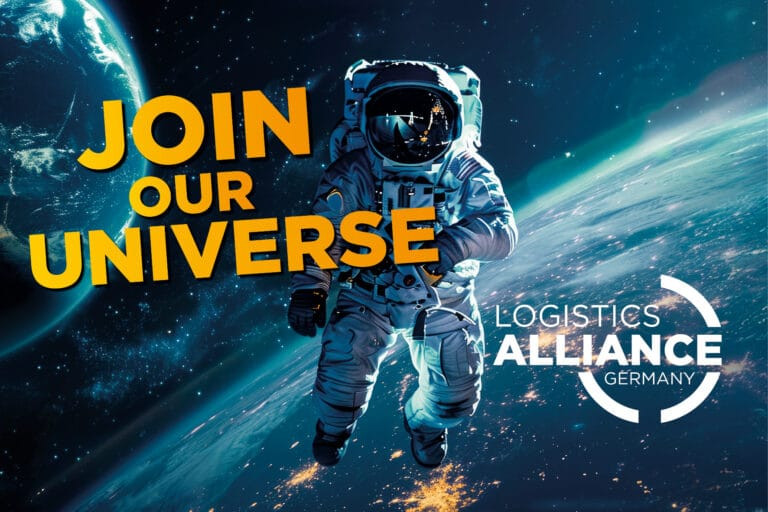For Logistics Alliance Germany (LAG), digitalisation in logistics is more than a project—it’s a core management philosophy. The organisation, led by Chairman Marc Oedekoven (KIBIX Logistics) and his colleagues on the board, Dr Frank Albers (KRONE) and Holger Dechant, is, amongst others, pursuing the goal of fully digitalising the entire logistics process, from initial customer requests to final delivery coordination.
According to Oedekoven, this transformation is already underway. Standard forwarding tasks, such as generating offers from customer enquiries, can now be handled largely by Artificial Intelligence (AI) and APIs, significantly speeding up response times and improving accuracy. However, more complex areas—such as import customs clearance—still present challenges. Assigning HS codes, for example, remains beyond current machine capabilities, though Oedekoven expects that to change within the year as AI models become more advanced.
“We do strongly believe that this entire process, the process of organising the logistics behind moving goods from A to B, can be digitalised to an extent of 100 percent—and this is now the target we are pursuing,” Oedekoven outlined.
“Digitalisation…can only be successful if the right people meet,” he emphasised. “Tech experts alone won’t create a successful digital forwarder. But tech experts with logistics specialists? That’s the combination that creates a truly digital supply chain.”
To reach its digitalisation targets, the LAG is fostering closer collaboration between logistics professionals and technology developers. This interdisciplinary approach, Oedekoven argues, is essential for creating scalable, effective digital solutions across the supply chain.
The impact will be broad—cost reduction, improved efficiency, a lighter environmental footprint, and relief for an industry struggling with labour shortages. “It will release some of the work people are doing today…so their intelligence and power can be used for different tasks,” he added.
Collaboration as infrastructure
Collaboration isn’t a nice-to-have—it’s the foundation. “It is absolutely key to success,” Oedekoven says. “It’s give and take. That means, for example, you need to give some data. In return, you gain valuable insights that you can take advantage of for your company.”
This philosophy underpins the alliance’s approach to digital transformation. “Without this collaboration…people live on virtual islands, not willing to share or collaborate. That doesn’t work in logistics.”
Germany’s political landscape supports this vision. A newly appointed Minister for Digitalisation—the first in the country’s history—provides a direct line to high-level decision-making. “He’s responsible not only for thinking but implementing. He has the power to decide at the highest level what the country should have as a framework,” says Oedekoven.
What sets Germany apart is not just its infrastructure—though it boasts major logistics hubs like Hamburg, Frankfurt, Duisburg, and Leipzig—but its openness to global input. “We try to be humble, not saying that Germany invented logistics,” Oedekoven notes. “Can we learn from other countries? Yes. But also, do we have something where others might be interested? Absolutely.”
And the alliance is doing more than just talking. A standout example is the partnership with the LAG member company Sommer, which developed a fully digitalised co-driver system for heavy airfreight trucking—streamlining everything from government permits to navigation and communication. “In conjunction with the German politics, in conjunction with the authorities, in conjunction with digital service providers, Sommer was able to deliver the solution,” says Oedekoven. “It’s a pretty nice success.”
Global position and the road ahead
Geographically and economically, Germany sits at the crossroads of global trade—and it knows it. “If you look at the trucks going across Europe, most of them will at a certain point cross Germany,” says Oedekoven. “That doesn’t make us proud, but it makes us an important partner.”
Germany’s ambition is to not only retain that central role but to define global standards in digital logistics. “None of the companies in Silicon Valley or China are yet defining global standards. Doing so is our target,” he states.
Oedekoven is realistic about challenges—especially around sustainability. “It is unlikely that we will ever be fully CO₂-neutral when it comes to ocean carriers or aircraft,” he says candidly. But where real gains can be made is efficiency. “If the average load factor on freighters is 65 percent, what about the 35 percent? That’s where AI and digitalisation come in—optimising routes, utilisation, and planning.”
As global trade flows shift, the alliance remains focused. “Some production is moving from China to Vietnam or Malaysia, yes. But that’s marginal compared to the scale of global logistics. Some production and distribution patterns might regain some regional focus, but you can’t stop globalisation—it’s gone too far,” he says.
Germany is also pivoting to new regions like Africa, and deepening ties with long-term partners like Singapore. “Not a big shift, but slightly refocusing,” Oedekoven notes.
Building the next generation
A key challenge lies ahead: attracting young talent to the logistics sector. “We couldn’t see a more attractive industry,” Oedekoven asserts. “Logistics is truly global. Consulting firms and banks think they are global—but a logistics company really is.”
He’s also a teacher and works directly with students. “The first question I ask in course: how many countries are involved in making producing and distributing your mobile phone? Most say 10, 15. The reality? 70 or more. That’s logistics.”
With topics like AI, sustainability, and cloud computing now central to logistics, Oedekoven believes the sector offers the intellectual and practical challenges young people are looking for. “We must spread the word. We must be active—starting in schools, continuing through universities.”
What’s needed, he adds, is a unified narrative that connects digitalisation, sustainability, and global collaboration. “You can’t silo these topics. It’s one story—and it’s the future of global logistics.”





